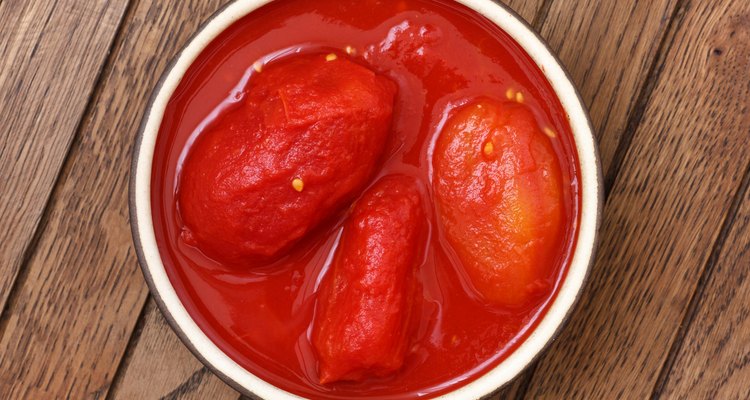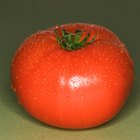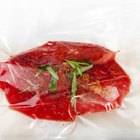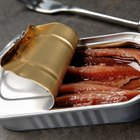
etienne voss/iStock/Getty Images
The advent of widespread, inexpensive refrigerators and freezers marked a significant change in the way food was preserved. Suddenly it was possible to keep high quality foods for extended periods, without the fuss of drying, smoking, canning or pickling. The freezer also became a convenient way to store foods that had been canned, once they were opened and no longer protected.
Canned Tomatoes
There is a persistent impression among many cooks that any canned vegetable represents a compromise, a triumph of convenience over quality. In the case of tomatoes, the exact opposite is often true. Canned tomatoes are usually picked when well ripened, and then taken a short distance to the cannery for processing. The end result is a tomato that's usually riper and better tasting than the mediocre fresh product that's available year-round at the supermarket. This is especially true of premium tomatoes, such as the imported San Marzano variety from Italy.
The Opened Can
You can store unopened cans of tomatoes for years in a cool, dry place. Once you've opened them, though, the tomatoes become as perishable as they were when they were new. Any unused tomatoes should be poured from the can into a food safe, airtight container as soon as possible. Large cans are typically a better buy than small cans, so if you use them regularly, it's often worth your while to purchase the largest size and divide it for freezing once you've opened them.
Freezing Diced Tomatoes
Use a good quality freezer containers for tomatoes because they will expand when they're frozen and lower-cost containers can sometimes split under the pressure. Divide the tomatoes into portion sizes that reflect your favorite recipes and only fill each container three-fourths full to leave room for expansion. You can also use heavy-duty freezer bags instead of containers. The bags will take up less space, but containers can be stacked for a more orderly freezer. Never freeze tomatoes in their can. The cans keep for years at room temperature but freezing may cause them to split.
Using Frozen Tomatoes
To use your frozen, canned tomatoes, pull them from the freezer the day before and let them thaw in your refrigerator. Several small portions thaw more efficiently than one large portion, so it's best to use small containers and take out as many as you need at a given meal. Diced canned tomatoes are usually made from the firmest tomatoes, so when you freeze them it will improve their texture and help them cook down more quickly for sauces.
Related Articles

How to Freeze Stewed Tomatoes
How to Cook & Freeze Fresh San Marzano ...

How to Blanch, Peel, & Freeze Whole ...

Can You Freeze Homemade Calzones?

How to Store and Freeze Sundried ...

Rules for Thawing and Refreezing Meat

Can You Freeze Canned Goods?

How to Tell When Tortellini Is Bad
How Long After the Expiration Date Can ...

How to Dry Tomatoes in the Oven
How to Freeze Green Tomatoes

How to Freeze Bratwurst

How to Can Salsa with a Pressure Canner

What Happens if Meat Unfreezes and Then ...

How to Freeze Sausage Biscuits

How to Dry Pack Long-Term Food in Mason ...

How to Freeze Cayenne Pepper
Can You Freeze Capers?

What Causes Ice Crystals on Frozen Food?

How to Store Opened Anchovies
References
Writer Bio
Fred Decker is a trained chef and prolific freelance writer. In previous careers, he sold insurance and mutual funds, and was a longtime retailer. He was educated at Memorial University of Newfoundland and the Northern Alberta Institute of Technology. His articles have appeared on numerous home and garden sites including GoneOutdoors, TheNest and eHow.
Photo Credits
etienne voss/iStock/Getty Images